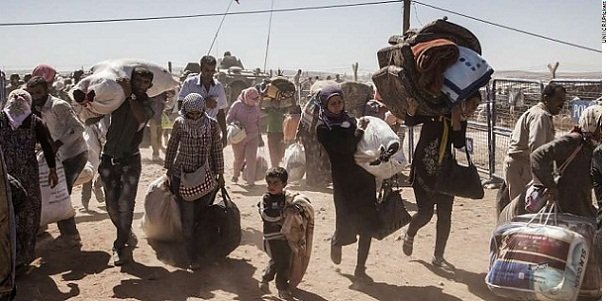UNHCR is hoping significant pledges will be made at The Third International Humanitarian Pledging Conference for Syria in Kuwait on 31 March.

Syrian Kurdish refugees cross into Turkey from Syria near the northern town of Kobane last year.
GENEVA [ ABN NEWS ] — As the Syrian conflict enters its fifth year, the UN refugee agency warned that millions of refugees in neighbouring countries and those displaced within the country are caught in deteriorating conditions, facing an even bleaker future without more international support.
“With no political solution to the conflict in sight, most of the 3.9 million Syrian refugees in Turkey, Lebanon, Jordan, Iraq and Egypt see no prospect of returning home in the near future, and have scant opportunity to restart their lives in exile,” a UNHCR statement released in Geneva said.
It added that well over half of all Syrian refugees in Lebanon live in insecure dwellings – up from a third last year – posing a constant challenge to keep them safe and warm. A survey of 40,000 Syrian families in Jordan’s urban areas found that two-thirds were living below the absolute poverty line.
UN High Commissioner for Refugees António Guterres reiterated that much, much more needed to be done to pull Syrians out of their nightmare of suffering. “After years in exile, refugees’ savings are long depleted and growing numbers are resorting to begging, survival sex and child labour. Middle-class families with children are barely surviving on the streets: one father said life as a refugee was like being stuck in quicksand – every time you move, you sink down further,” he said.
“This worst humanitarian crisis of our era should be galvanizing a global outcry of support, but instead help is dwindling. With humanitarian appeals systematically underfunded, there just isn’t enough aid to meet the colossal needs – nor enough development support to the hosting countries creaking under the strain of so many refugees,” Guterres added.
The High Commissioner pointed out that with the massive influx of Syrian refugees over the past four years, Turkey had now become the world’s biggest refugee hosting country and had spent more than US$6 billion on direct assistance to refugees.
But faced with growing security concerns and insufficient international support, several of Syria’s neighbours have taken measures in recent months to stem the flow of refugees, from new border management regulations to more onerous and complex requirements to extend their stay.
“More and more Syrians are losing hope. Thousands have tried to reach Europe by taking often deadly land or sea routes after paying their life savings to smugglers. Many have not made it. Those who do, face rising hostility as refugees are conflated with security concerns in a climate of rising panic,” the UNHCR statement said.
High Commissioner Guterres said that “refugees are made scapegoats for any number of problems from terrorism to economic hardship and perceived threats to their host communities’ way of life. But we need to remember that the primary threat is not from refugees, but to them.”
Inside Syria, the situation is deteriorating rapidly. More than 12 million people are in need of aid to stay alive. Almost 8 million have been forced from their homes, sharing crowded rooms with other families or camping in abandoned buildings. An estimated 4.8 million Syrians inside the country are in places that are hard to reach, including 212,000 trapped in besieged areas.
Millions of children are suffering from trauma and ill health. A quarter of Syria’s schools have been damaged, destroyed or taken over for shelter. More than half of Syria’s hospitals are destroyed.
More than 2.4 million children inside Syria are not in school. Among refugees, nearly half of all children are not receiving an education in exile. In Lebanon, there are more school-age refugees than the entire intake of the country’s public schools, and only 20 per cent of Syrian children are enrolled. Similar numbers can be seen among refugees living outside of camps in Turkey and Jordan.
“We have only a narrow opportunity to intervene now as this potentially lost generation confronts its future. Abandoning refugees to hopelessness only exposes them to even greater suffering, exploitation and dangerous abuse,” Guterres warned.
There are more Syrians under UNHCR’s care today than any other nationality on earth. Yet by the end of last year, only 54 per cent of the funding needed to assist refugees outside Syria had been raised. Inside Syria, humanitarian organizations received even less.
In December, the UN launched the largest aid appeal ever for $8.4 billion. Fully funded, this would cover basic needs for refugees, while also helping host communities to bolster their infrastructure and services. UNHCR is hoping significant pledges will be made at The Third International Humanitarian Pledging Conference for Syria in Kuwait on March 31.
“Further abandoning host countries to manage the situation on their own could result in serious regional destabilisation, increasing the likelihood of more security concerns elsewhere in the world,” Guterres stressed.
SINCE 1924: ABN NEWS + BRAZILIAN NEWS AGENCY
DESDE 1924: ABN AGÊNCIA BRASILEIRA DE NOTÍCIAS

Você precisa fazer login para comentar.